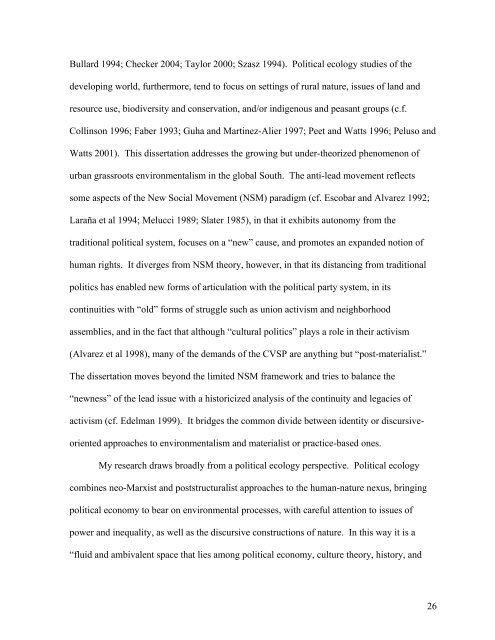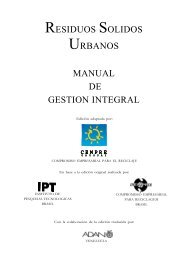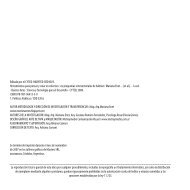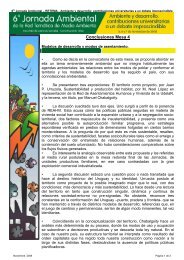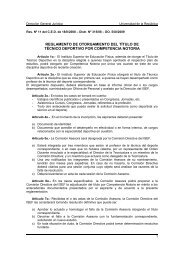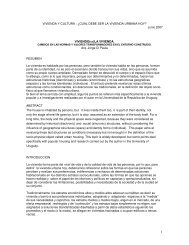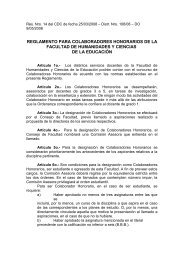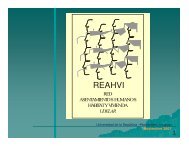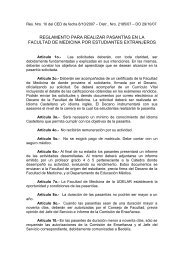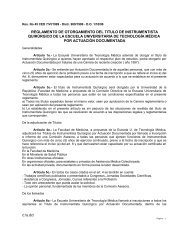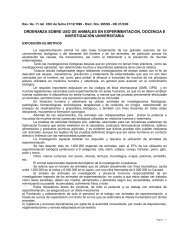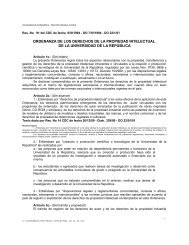- Page 1 and 2: “WE ARE ALL CONTAMINATED” LEAD
- Page 3 and 4: Accepted in partial fulfillment of
- Page 5 and 6: Dedicated in loving memory to my ab
- Page 7 and 8: have provided support in too many v
- Page 9 and 10: workshop on lead poisoning at the C
- Page 11 and 12: TABLE OF CONTENTS LIST OF FIGURES .
- Page 13 and 14: 3.3.3 “I haven’t had a decorous
- Page 15 and 16: Factories..........................
- Page 17 and 18: CHAPTER ONE: Introduction: “We ar
- Page 19 and 20: in Latin America. Amid processes of
- Page 21 and 22: understand the various challenges a
- Page 23 and 24: My principal methods of fieldwork w
- Page 25 and 26: commercial and community media, the
- Page 27 and 28: methodologically necessary to gain
- Page 29 and 30: its spontaneity and instant reflect
- Page 31 and 32: embarrassments provided the final b
- Page 33 and 34: the tetraethyl lead (TEL) gasoline
- Page 35 and 36: The growing informal economy of the
- Page 37 and 38: Teja exemplifies the drastic transf
- Page 39 and 40: disorganization and unfathomable cr
- Page 41: state. Forms of structural violence
- Page 45 and 46: Lead is a potent neurotoxin that ha
- Page 47 and 48: of molasses for rum (Bellinger and
- Page 49 and 50: 80μg/dl was considered “toxic,
- Page 51 and 52: mobilization and release of existin
- Page 53 and 54: conduction (Needleman 2004). Visuo-
- Page 55 and 56: While individual context and respon
- Page 57 and 58: eflected a position (tinged with cu
- Page 59 and 60: levels of 7,500 mg/kg, and in anoth
- Page 61 and 62: norm and the continuing lack of com
- Page 63 and 64: cover letter of the project, while
- Page 65 and 66: the dumped garbage “comes from al
- Page 67 and 68: community-building device by means
- Page 69 and 70: contributing factor to the broader
- Page 71 and 72: forms of environmental consciousnes
- Page 73 and 74: for tens of thousands. The deaths i
- Page 75 and 76: order to channel its aid, but no le
- Page 77 and 78: megafauna” (Smith 1996) that have
- Page 79 and 80: were subjected to green revolution
- Page 81 and 82: onslaught on other Latin American c
- Page 83 and 84: domesticate human nature through th
- Page 85 and 86: The disciplining of human nature du
- Page 87 and 88: anthropologist and historian Daniel
- Page 89 and 90: Uruguay. Romantic portrayals of rur
- Page 91 and 92: well as emerging forms of human eng
- Page 93 and 94:
The redefinition of Uruguayan natio
- Page 95 and 96:
As sustainability becomes “mainst
- Page 97 and 98:
ecession, the book states: “In re
- Page 99 and 100:
Despite the ubiquitous chemical con
- Page 101 and 102:
and the multiple poisons carried by
- Page 103 and 104:
While the economic crisis temporari
- Page 105 and 106:
environmental sensibility in recent
- Page 107 and 108:
international environmental quality
- Page 109 and 110:
Uruguay was relatively late in rati
- Page 111 and 112:
not until January 1999 that the fir
- Page 113 and 114:
First of all the judges are not acc
- Page 115 and 116:
Ambiental Montevideo- GAM) was also
- Page 117 and 118:
issues in the national media, which
- Page 119 and 120:
The RETEMA dedicated a working grou
- Page 121 and 122:
unsuitable to traditional Uruguayan
- Page 123 and 124:
Grassroots groups and NGOs have ins
- Page 125 and 126:
CHAPTER THREE: “La Teja Shall Sin
- Page 127 and 128:
the experience of an old revolution
- Page 129 and 130:
This chapter questions how long tim
- Page 131 and 132:
Uruguay (Amorín 2003). The 1994 na
- Page 133 and 134:
Of the burgeoning environmental mov
- Page 135 and 136:
Men and women volunteered labor equ
- Page 137 and 138:
early twentieth-century technology
- Page 139 and 140:
protection becomes intimately tied
- Page 141 and 142:
Pilo and other members of the CVSP,
- Page 143 and 144:
environment” dichotomy, and confr
- Page 145 and 146:
Pilo and Amorín had a difficult ti
- Page 147 and 148:
scrutiny of ANCAP’s leaded gasoli
- Page 149 and 150:
we thought that we were alone, we w
- Page 151 and 152:
products due to bureaucratic hurdle
- Page 153 and 154:
Mr. Linardi told me the pay at Rade
- Page 155 and 156:
that he was “too localized.” In
- Page 157 and 158:
conformed his “home” surroundin
- Page 159 and 160:
issue, particularly the consciousne
- Page 161 and 162:
which he remedies as best he can wi
- Page 163 and 164:
government home they were to be giv
- Page 165 and 166:
conditions of the UMNTRA and Fanaes
- Page 167 and 168:
time I visited the school, director
- Page 169 and 170:
income.” It depends entirely on d
- Page 171 and 172:
Working in the community is rather
- Page 173 and 174:
The CVSP organized in June 2001 a c
- Page 175 and 176:
poems, thoughts, and messages, and
- Page 177 and 178:
After presenting a series of demand
- Page 179 and 180:
evindicating popular or grassroots
- Page 181 and 182:
with the group’s first-ever atten
- Page 183 and 184:
and doing the “dirty work” for
- Page 185 and 186:
A Parliament-sponsored survey of th
- Page 187 and 188:
the Frente Amplio, the center-left
- Page 189 and 190:
16.112 that created the Ministry of
- Page 191 and 192:
immediate vicinity of the González
- Page 193 and 194:
This divergent stance may in part b
- Page 195 and 196:
networks, citizens challenged the f
- Page 197 and 198:
determined to contain elevated soil
- Page 199 and 200:
children with lead poisoning in the
- Page 201 and 202:
dumped it, or the governing institu
- Page 203 and 204:
4.3 “Greening” and Localizing S
- Page 205 and 206:
ecognition of lead contamination an
- Page 207 and 208:
public health authorities, the CDC
- Page 209 and 210:
4.3.3 “You can’t hide a known t
- Page 211 and 212:
This same community I’m talking a
- Page 213 and 214:
Ministry. While given to frequent f
- Page 215 and 216:
4.3.4 “That’s how Uruguay is”
- Page 217 and 218:
contamination outbreak was identifi
- Page 219 and 220:
their original program. Later they
- Page 221 and 222:
scientists of the state. Power is v
- Page 223 and 224:
have reduced the officially recogni
- Page 225 and 226:
edrawn at the local level according
- Page 227 and 228:
CHAPTER FIVE: “No Somos Marginado
- Page 229 and 230:
combination of fascination and disg
- Page 231 and 232:
“new poor” to the processes of
- Page 233 and 234:
the three processes of labor, educa
- Page 235 and 236:
increasingly homogenized, with the
- Page 237 and 238:
predominant sense of resignation an
- Page 239 and 240:
mechanical versus organic solidarit
- Page 241 and 242:
exploited terms, according to these
- Page 243 and 244:
follow years after the so-called
- Page 245 and 246:
oth literally and symbolically. The
- Page 247 and 248:
for a worldwide ban of interior whi
- Page 249 and 250:
house cleaning and child rearing pr
- Page 251 and 252:
serving, individualist, impulsive a
- Page 253 and 254:
Otherwise, “parents marginalize t
- Page 255 and 256:
emphasis on the structural and syst
- Page 257 and 258:
ideology, the worker epically confr
- Page 259 and 260:
5.6 “No somos marginados.” Othe
- Page 261 and 262:
wound up to a second floor in the m
- Page 263 and 264:
acknowledging the need and destitut
- Page 265 and 266:
of being. The latter sense often ca
- Page 267 and 268:
as humans and citizens. Lead poison
- Page 269 and 270:
poor attributable to the extreme
- Page 271 and 272:
CHAPTER SIX: “Reality Overwhelms
- Page 273 and 274:
Amorín, Milka Pereira, and Carlos
- Page 275 and 276:
is that people no longer mobilize.
- Page 277 and 278:
environmental landscape and socio-e
- Page 279 and 280:
campaigns to raise awareness of env
- Page 281 and 282:
source of tension within the left,
- Page 283 and 284:
while valuable should also be chann
- Page 285 and 286:
“participation” as a central te
- Page 287 and 288:
Large industries have for the first
- Page 289 and 290:
smoldering and releasing a white cl
- Page 291 and 292:
the environment remains suspect for
- Page 293 and 294:
were holding the small native Tarum
- Page 295 and 296:
install in an area, and then the wo
- Page 297 and 298:
per day, thereby being entitled to
- Page 299 and 300:
the installation of a hospital wast
- Page 301 and 302:
action in Uruguay led by Enrique Vi
- Page 303 and 304:
pollution. They have highlighted th
- Page 305 and 306:
his presidency. These close ties ha
- Page 307 and 308:
2005). 194 The content of this atta
- Page 309 and 310:
The EIA process is a form of “adm
- Page 311 and 312:
impacts (Pierri 2002: 317). The Sta
- Page 313 and 314:
multilateral investment agreements,
- Page 315 and 316:
establish themselves here.” 201 U
- Page 317 and 318:
positions to take. This does not ne
- Page 319 and 320:
leaders organically, rising from po
- Page 321 and 322:
7.0 Journal entry: December 29, 200
- Page 323 and 324:
and informality. De-industrializati
- Page 325 and 326:
“greened” over the past several
- Page 327 and 328:
even transnational ones, drawing th
- Page 329 and 330:
feared yet unknowable, graphically
- Page 331 and 332:
in similar ways to the Madres de la
- Page 333 and 334:
2005: 221) and the “deeper social
- Page 335 and 336:
Workers are also forging new arenas
- Page 337 and 338:
that I had the State that I thought
- Page 339 and 340:
APPENDIX A: Time Line of Lead Poiso
- Page 341 and 342:
March May June July October Novembe
- Page 343 and 344:
December 2005 January March June Ju
- Page 345 and 346:
• The United Nations Climate Chan
- Page 347 and 348:
Alvarez, S., E. Dagnino, and A. Esc
- Page 349 and 350:
Auyero, Javier 1997 Wacquant in the
- Page 351 and 352:
Berglund, Eeva 1998 Knowing Nature,
- Page 353 and 354:
2003 Intellectual impairment in chi
- Page 355 and 356:
Cousillas, Marcelo 2001 Ley General
- Page 357 and 358:
2002 Uruguay, Segundo en América e
- Page 359 and 360:
Fortun, K., and M. Fortun. 2005 Sci
- Page 361 and 362:
— 2004 Regresaron los soñadores
- Page 363 and 364:
Hernandez-Avila, M., M. Cortez-Lugo
- Page 365 and 366:
Kovacic, Fernando 2004 Maldita Ecol
- Page 367 and 368:
Manganey, G. 1993 Legislación ambi
- Page 369 and 370:
Muniz, P., E. Danulat, B. Yannicell
- Page 371 and 372:
2002 Introduction. Why Anthropologi
- Page 373 and 374:
Pierri, Naina 2002 La EIA en Urugua
- Page 375 and 376:
2005 The Cost of Being Poor. Povert
- Page 377 and 378:
2000 Introduction: Reflections on t
- Page 379 and 380:
Trigo, Abril 1990 Caudillo, Estado,
- Page 381:
NEWSPAPER ARTICLES 2001 Informe Amb


